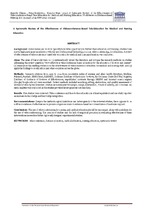A systematic review of the effectiveness of videoconference-based tele-education for medical and nursing education.
Abstract
BACKGROUND: Rural nurses and doctors typically have little opportunity to further their education and training. Studies have shown high participant satisfaction with the use of educational technology, such as videoconferencing, for education. A review of effectiveness of videoconference-based tele-education for medical and nursing education was conducted. AIMS The aims of this study were to: (1) systematically review the literature and critique the research methods on studies addressing the review question: “How effective is videoconference-based education for the education of doctors and nurses?” (2) summarize the existing evidence on the effectiveness of videoconference education for medical and nursing staff; and (3) apply the findings to South Africa and other countries across the globe.
Methods: Research citations from 1990 to 2011 from cumulative index of nursing and allied health literature, Medline, Pubmed, PsycInfo, EBSCOhost, SABINET, Cochrane Database of Systematic Reviews, the Cochrane Controlled Trial Registry, Database of Abstracts of Reviews of Effectiveness, unpublished abstracts through NEXUS and Internet search engines (Google/Google scholar) were searched. Review methods included searching, sifting, abstraction, and quality assessment of relevant studies by two reviewers. Studies were evaluated for sample, design, intervention, threats to validity, and outcomes. No meta-analysis was conducted as the studies provided heterogeneous outcome data.
RESULTS: Five studies were reviewed. Videoconference and face-to-face education is at least equivalent and one study reported an increase in knowledge and knowledge integration. Recommendations: Despite the methodological limitations and heterogeneity of the reviewed studies, there appears to be sufficient evidence of effectiveness to provide a rigorous Grade B evidence-based recommendation of moderate support.
Conclusions: The use of videoconferencing for nursing and medical education should be encouraged along with guidelines for the use of videoconferencing. The paucity of studies and the lack of empirical precision in evaluating effectiveness of these interventions necessitate future rigorously designed
experimental studies.

